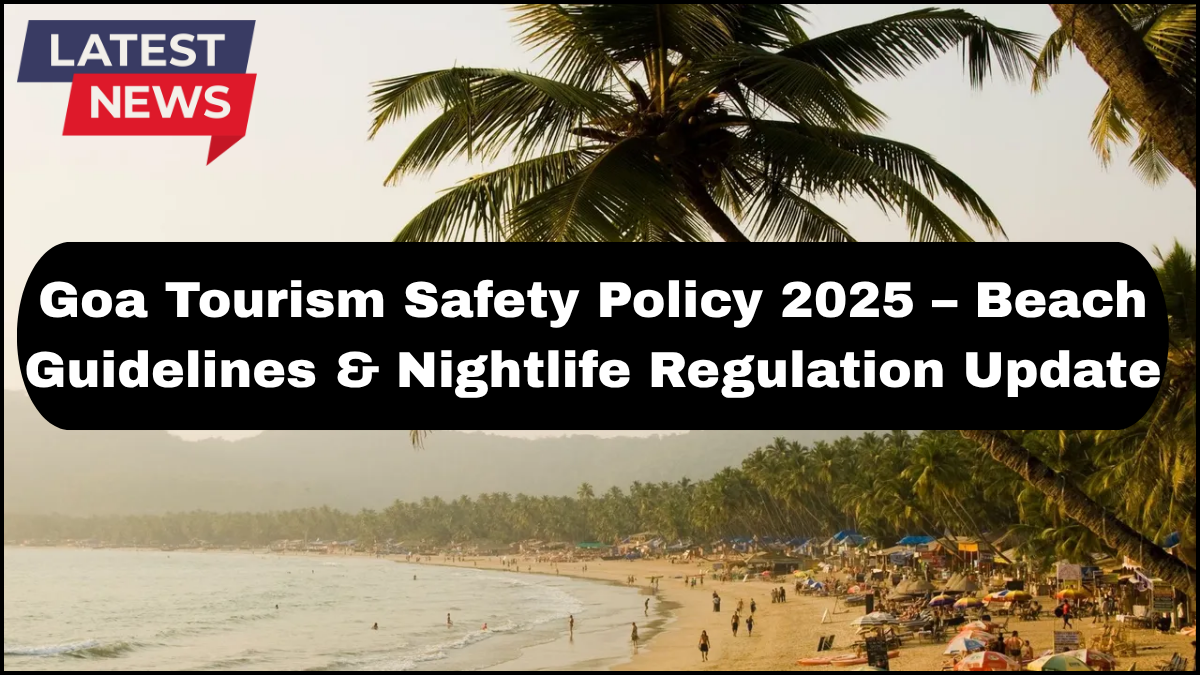Goa’s charm has long attracted millions with its golden beaches, vibrant nightlife, and relaxed coastal vibe. But with increasing tourist footfall comes the responsibility of ensuring a safe and secure environment for both visitors and locals. The Goa Tourism Safety Policy 2025 represents a major shift in how tourism is managed, focusing on structured safety reforms, especially regarding beach safety & nightlife rules.

Below, we break down the key updates, regulatory changes, and what tourists and businesses need to know in 2025 and beyond.
Overview of the Goa Tourism Safety Policy 2025
The Goa Tourism Safety Policy 2025 is a strategic initiative introduced by the Department of Tourism, Government of Goa. Its objective is to enhance the safety standards in Goa’s tourist zones while balancing the region’s free-spirited appeal. This policy has been crafted after consultations with law enforcement, tourism stakeholders, beach shack owners, nightlife venues, and public safety experts.
Key goals of the policy include:
-
Ensuring public safety without curbing tourist freedom
-
Enforcing responsible tourism practices
-
Strengthening the accountability of hospitality and entertainment operators
-
Reducing alcohol-related incidents and beach mishaps
New Beach Safety Guidelines
Beach safety is at the core of this year’s updated policy. With over 100 kilometers of coastline, Goa sees thousands of tourists crowd its beaches daily. Here’s what’s new:
1. Mandatory Lifeguard Coverage
Every designated beach will now have round-the-clock lifeguard services, especially during peak tourist hours (6:00 AM – 8:00 PM). Private resorts with beach access must coordinate with the state’s Lifesaving Force to ensure prompt response to any emergencies.
2. Flag-Based Swimming Zones
Clear, color-coded flags will now indicate safe swimming zones:
-
Green – Safe for swimming
-
Yellow – Caution advised
-
Red – Dangerous or restricted zones
Swimming outside flagged zones is now considered a violation under the new beach safety protocols.
3. Alcohol Ban Near Shorelines
Carrying or consuming alcohol within 200 meters of the waterline is now prohibited. This aims to curb drowning accidents and maintain public order, especially during sunset gatherings and beach parties.
4. Beach Activity Licensing
All vendors offering water sports, parasailing, or jet-ski services must be licensed and undergo safety audits every six months. Operators found violating safety protocols face immediate license suspension.
Updated Nightlife Regulation & Safety Standards
Goa’s nightlife is world-renowned, but it’s also been a source of concern for public safety. Under the Goa Tourism Safety Policy 2025, nightlife establishments are now subject to tighter oversight.
1. Timed Operations & Sound Limitations
Nightclubs and beach parties must now cease amplified music by 1:00 AM, in line with the state’s noise pollution guidelines. Exceptions are only granted during major festivals (like Sunburn and New Year’s Eve) under special permits.
2. Compulsory Surveillance and Security
All nightlife venues are now required to:
-
Install 24/7 CCTV coverage with recordings stored for at least 30 days
-
Employ trained bouncers, including at least one female guard for mixed-gender safety
-
Display emergency contact numbers and exit plans at multiple points in the venue
3. Alcohol Service Regulations
Bars and clubs are mandated to stop serving alcohol by 12:30 AM and must follow strict ID checks to prevent underage drinking. Surprise compliance audits will be conducted by the Excise and Tourism departments.
4. Taxi & Transport Integration
To reduce post-party accidents, the policy introduces a state-monitored ride-hailing system around nightlife hubs. These cabs will be GPS-tracked, with verified drivers to ensure safe return trips for partygoers.
Education & Awareness Campaigns
The Goa government isn’t just enforcing rules—it’s also educating. Awareness campaigns are being run in airports, railway stations, and social media platforms. Flyers, billboards, and QR-code posters provide tourists with quick access to safety guidelines in multiple languages.
Additionally, tour operators are now required to give a safety briefing as part of their onboarding for groups.
Impact on Tourism and Local Business
While some stakeholders initially expressed concerns about tighter controls, early signs suggest positive change. Beaches are cleaner, late-night disturbances have decreased, and a sense of order is returning without stifling the region’s spirit.
The tourism department has reassured businesses that these reforms aim to enhance the visitor experience, not restrict it. By reducing avoidable risks, Goa is positioning itself as not only a fun destination but a safe one for families, solo travelers, and international tourists alike.
FAQs on Goa Tourism Safety Policy 2025
Q1: Can tourists still enjoy beach parties under the new rules?
Yes, but within regulated hours and sound limits. Beach events need proper permits, and music must end by 1:00 AM.
Q2: Is alcohol completely banned on beaches?
Not entirely, but consumption near shorelines (within 200 meters) is prohibited. Alcohol is allowed at licensed beach shacks and bars.
Q3: Are nightclubs closing earlier now?
Most clubs now stop music at 1:00 AM and alcohol service at 12:30 AM. However, extensions are possible for events with special permissions.
Q4: What happens if someone swims outside the flagged zones?
It’s a safety violation. Lifeguards will intervene, and repeated violations can result in fines.
Q5: Are tourists informed of these rules before arrival?
Yes. The tourism board is working with airlines, hotels, and travel agencies to ensure tourists receive updated safety information upon arrival.
click here to learn more